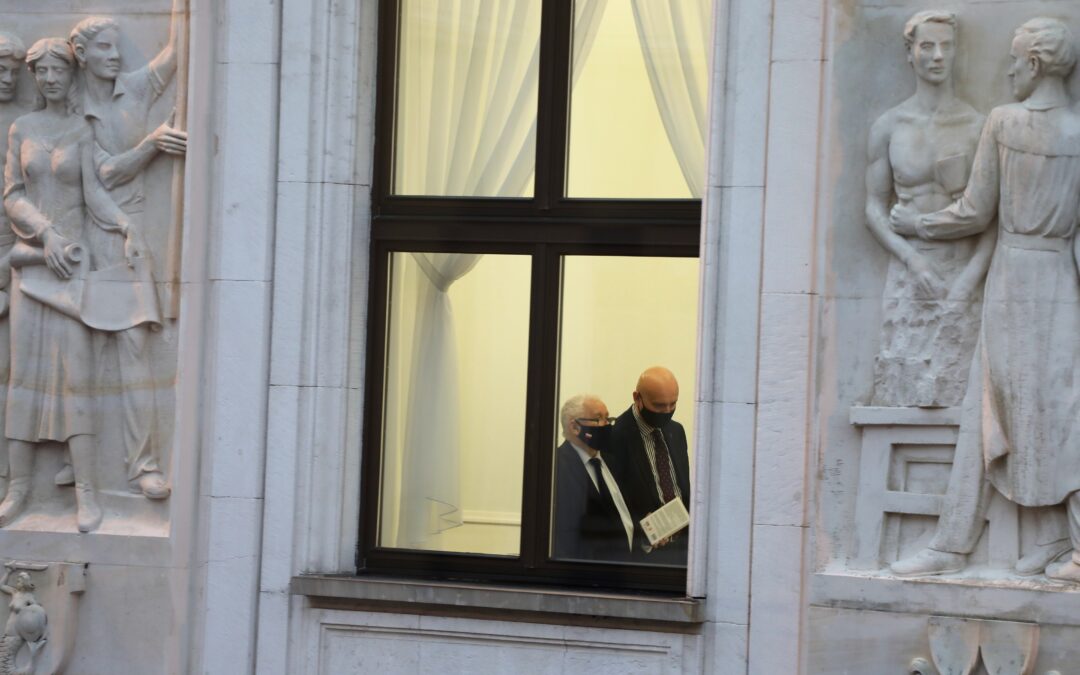Russia has prepared plans to invade Poland, Jarosław Kaczyński, the country’s most powerful politician, reportedly warned MPs during the first closed session of parliament since 2014.
The chairman of the ruling national-conservative Law and Justice (PiS) said that recent cyberattacks against leading Polish officials and institutions may be part of the Russian operation.
Kaczyński, who serves as deputy prime minister charged with overseeing national security, revealed that new legislation is being prepared to give the government greater tools to monitor digital security, according to inside sources cited by Onet and Gazeta Wyborcza.
He also reportedly accused some MPs of being hostile towards the Polish state. Two parliamentarians from the largest opposition party – whose leader had opposed holding the session behind closed doors – left the chamber in protest.
Meanwhile, emails purportedly from the hacked private account of the prime minister’s chief of staff have continued to be posted online, providing glimpses of discussions of sensitive subjects, though their authenticity has not been confirmed.
For more on the recent spate of hacks of email and social media accounts belonging to figures associated with Poland's ruling party, see our report from last week https://t.co/EWNfvIdZfv
— Notes from Poland 🇵🇱 (@notesfrompoland) June 15, 2021
On Tuesday, Prime Minister Mateusz Morawiecki requested that a secret session of the Sejm, the lower house of parliament, be held to discuss the recent spate of cyberattacks against state institutions and officials associated with PiS, including his own chief of staff, Michał Dworczyk.
The government has found that between 4,000 and 4,500 accounts have been hacked and around 70,000 emails taken, reports Onet. Earlier this year, one of the victims, PiS MP Marek Suski, claimed that hacking incidents may be part of a “hybrid war” launched by a neighbouring country against Poland.
In recent days, emails purported to be from Dworczyk’s private inbox have been posted online revealing, among other things, that the government considered deploying the army in response to mass protests against a near-total ban on abortion last year.
However, experts warn that hackers often mix genuine documents with faked ones. Officials have indicated that some of the material is falsified, but are not confirming or denying the authenticity of individual leaked emails.
In response to the calling of yesterday’s closed session, Borys Budka, leader of the centrist Civic Platform (PO), Poland’s largest opposition party, accused the government of “wanting to cover up your own incompetence”.
As MPs arrived for the meeting, they were checked to ensure they did not bring in any devices capable of recording or transmitting images or sound. Television cameras and wi-fi were turned off.
While no official accounts are available, Onet’s sources say that Kaczyński took to the rostrum when asked by an opposition MP about whether the government had considered using the army against protesters.
After claiming that those protests were illegal, the deputy prime minister then reportedly said that Moscow had prepared plans for an invasion of Poland and that the recent cyberattacks may be part of this.
He revealed that legislation will soon be submitted to parliament to give the government greater powers to monitor digital security, and reportedly added that this would be an opportunity to see who is really a patriot.
Onet’s sources also said that Kaczyński declared there are many members of the Sejm who are hostile to the Polish state, and warned that the justice minister, Zbigniew Ziobro, “notes down everything”. PiS and its chairman have in the past repeatedly accused the opposition of being traitors.
MPs speaking anonymously to Gazeta Wyborcza confirmed Onet’s account. One said that government figures had warned the opposition that, by sharing allegedly hacked material, they were supporting “the disinformation Poland’s enemies are trying to sow”.
J. Kaczynski to The opposition:
Don't rub your mug with my brother, you have destroyed and murdered him, you traitorous scum. pic.twitter.com/b7BPHgcla6— Paweł Wójcik (@SaladinAlDronni) July 19, 2017
Two MPs from PO, Michał Szczerba and Dariusz Joński, decided to leave the session in protest. “We do not trust the person who presents the main issue,” said Szczerba, quoted by Do Rzeczy. “This is the person responsible for various types of irregularities.”
The head of PO’s parliamentary caucus, Cezary Tomczyk, warned that the government’s plans for new cybersecurity legislation may “restrict civil rights” and “strike at the freedom of the internet”.
“Today’s session was a mockery,” said Krzysztof Gawlowski, head of the parliamentary caucus of The Left (Lewica), the second largest opposition group. He claimed that no information justifying secrecy was shared and that the sitting saw MPs advised on how to use their electronic devices securely.
To kpina z instytucji niejawnego posiedzenia, a przede wszystkim brak jakichkolwiek informacji, o których moglibyśmy powiedzieć, że mają charakter tajny. Rządzący nie powiedzieli o niczym, co miałoby znaczenie dla bezpieczeństwa Polski.https://t.co/4bkVIXJULe pic.twitter.com/GCnJIzzUZ0
— Lewica (@__Lewica) June 16, 2021
Even one PiS MP, when asked if the information shared at the sitting required secrecy, admitted that it did not and “could have been presented in an open session”.
Government spokesman Piotr Müller, however, criticised “some people” in parliament for “not taking a constructive approach” during the gathering.
Müller also warned that in the coming “weeks, perhaps for even longer, Poland will be the subject of an unprecedented information and disinformation attack…that mix[es] truthful information with information that is completely untrue”.
Germany using “systematic information activities” to evade WW2 responsibility, says Polish spokesman
Main image credit: Slawomir Kaminski / Agencja Gazeta

Daniel Tilles is editor-in-chief of Notes from Poland. He has written on Polish affairs for a wide range of publications, including Foreign Policy, POLITICO Europe, EUobserver and Dziennik Gazeta Prawna.




















